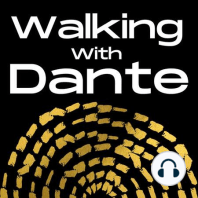26 min listen

Wide Awake With Cereberus In The Third Circle Of Hell: Inferno, Canto VI, Lines 1 - 33
Wide Awake With Cereberus In The Third Circle Of Hell: Inferno, Canto VI, Lines 1 - 33
ratings:
Length:
31 minutes
Released:
Jan 3, 2021
Format:
Podcast episode
Description
Dante-the-pilgrim wakes up in the third circle of hell, a weather-dominated place, full of hail, rain, and snow, all making the rancid ground a mucky swamp.
Wakes up? How'd he get there?
Nonetheless, he and Virgil first encounter the elements, the foul rain and mud; then they come upon the guard dog Cerberus. Virgil doesn't try his little word spell this time. Instead, he does something wilder: he rewrites his own work, THE AENEID. This is the first time Virgil is forced to rewrite his own work. And it won't be the last!
Join me, Mark Scarbrough, as we walk across THE DIVINE COMEDY and take a first look at this new rung of hell, a place where we'll come to understand that gluttony combined with envy is a recipe for social disaster.
Here are the segments for this episode:
[00:29] My English translation of the passage from INFERNO: Canto VI, lines 1 - 33.
[03:26] A question about the mind/body split--which will play out in surprising ways in this canto, including questions about the body politic. And a last look at Francesca and Paolo--with questions about how they may well be walled off from what happens next in the poem.
[06:19] How does Dante-the-pilgrim descend a level? It's a harder question that you might first imagine.
[10:08] The third circle of hell itself. And the first references to Aristotle, who will come to dominate this canto.
[12:37] Cerberus! Plus lots about this three-headed dog from THE AENEID.
[21:47] The canto's one and only simile--which is, well, rather workaday. Is this a function of the increasing pressure of pacing in the poem? Or are we beginning to run into the limits of writing by "topos"? (Much discussion here on this rhetorical strategy, one lost to the modern world.)
[28:33] I read the passage again, just because it's good to hear after discussing it.
Wakes up? How'd he get there?
Nonetheless, he and Virgil first encounter the elements, the foul rain and mud; then they come upon the guard dog Cerberus. Virgil doesn't try his little word spell this time. Instead, he does something wilder: he rewrites his own work, THE AENEID. This is the first time Virgil is forced to rewrite his own work. And it won't be the last!
Join me, Mark Scarbrough, as we walk across THE DIVINE COMEDY and take a first look at this new rung of hell, a place where we'll come to understand that gluttony combined with envy is a recipe for social disaster.
Here are the segments for this episode:
[00:29] My English translation of the passage from INFERNO: Canto VI, lines 1 - 33.
[03:26] A question about the mind/body split--which will play out in surprising ways in this canto, including questions about the body politic. And a last look at Francesca and Paolo--with questions about how they may well be walled off from what happens next in the poem.
[06:19] How does Dante-the-pilgrim descend a level? It's a harder question that you might first imagine.
[10:08] The third circle of hell itself. And the first references to Aristotle, who will come to dominate this canto.
[12:37] Cerberus! Plus lots about this three-headed dog from THE AENEID.
[21:47] The canto's one and only simile--which is, well, rather workaday. Is this a function of the increasing pressure of pacing in the poem? Or are we beginning to run into the limits of writing by "topos"? (Much discussion here on this rhetorical strategy, one lost to the modern world.)
[28:33] I read the passage again, just because it's good to hear after discussing it.
Released:
Jan 3, 2021
Format:
Podcast episode
Titles in the series (100)
Virgil And His Misunderstanding Of The Harrowing Of Hell: Inferno, Canto IV, Lines 46 - 84 by Walking With Dante